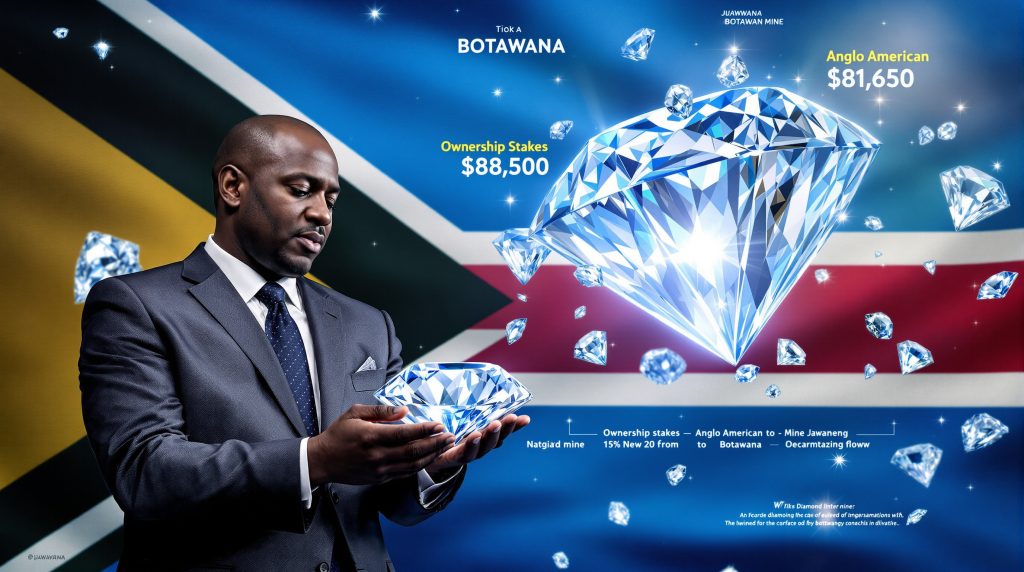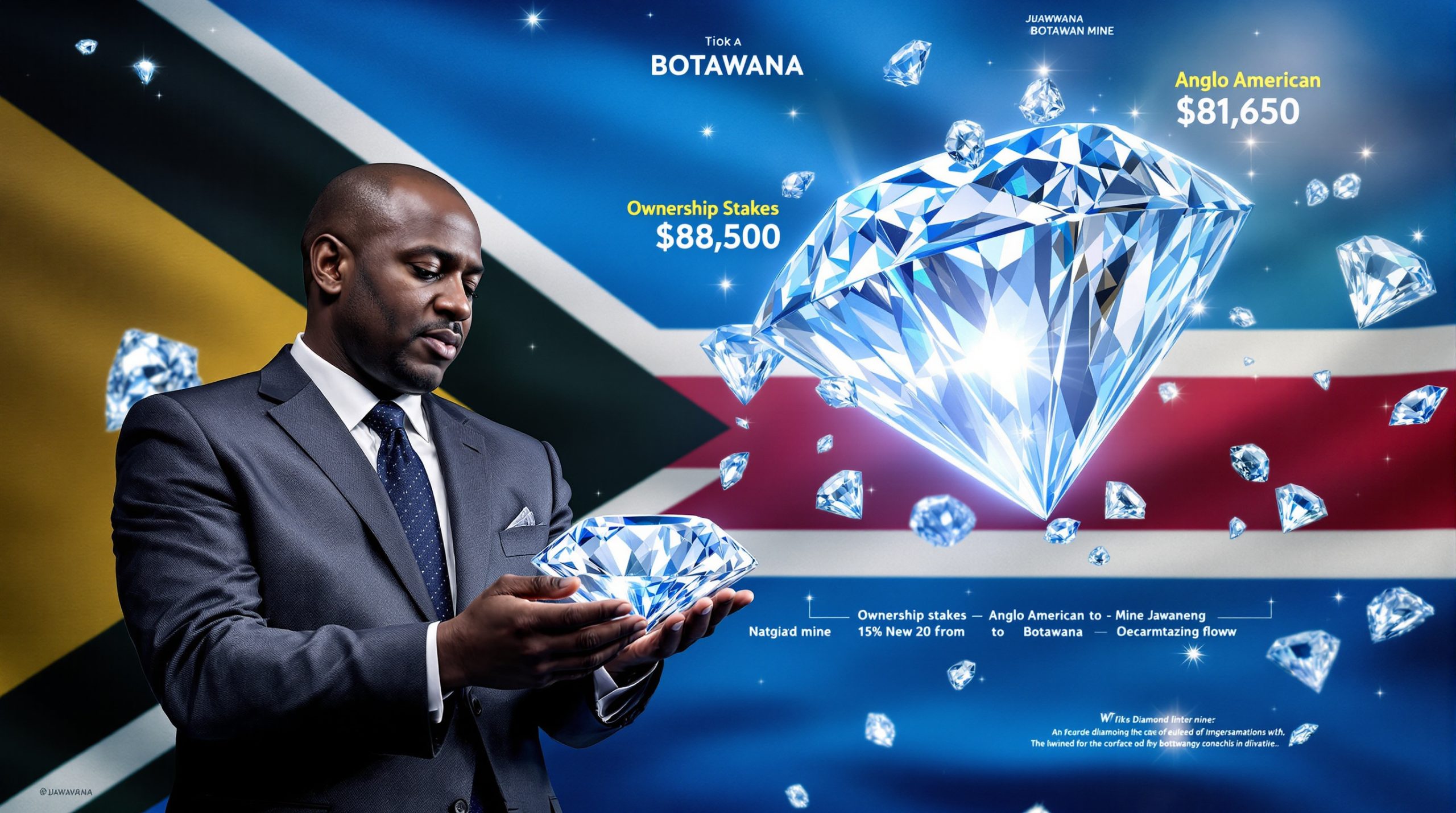Botswana's Bold Move: The Quest for Diamond Sovereignty Through De Beers
In a strategic maneuver that could reshape the global diamond industry, Botswana is actively negotiating to transform its relationship with diamond giant De Beers. The African nation aims to increase its current 15% stake to a controlling majority position by October 2025, a move that would fundamentally alter power dynamics in the international diamond market and establish a new paradigm for resource-rich nations.
What is Botswana's Current Relationship with De Beers?
Botswana's relationship with De Beers runs deeper than its 15% ownership stake might suggest. The cornerstone of this partnership is Debswana, a 50/50 joint venture established decades ago that has evolved into the backbone of Botswana's diamond industry.
Through Debswana, Botswana effectively controls approximately 70% of De Beers' global diamond production, providing significant leverage in the ongoing negotiations. This arrangement has been mutually beneficial, allowing De Beers access to Botswana's exceptional diamond resources while providing the nation with a steady revenue stream.
The relationship has gradually evolved beyond mere extraction. The Diamond Trading Company Botswana (DTCB) now handles the critical functions of sorting and valuing rough diamonds within the country, creating additional employment and expertise. Furthermore, the government-owned Okavango Diamond Company independently markets a portion of national production, demonstrating Botswana's growing capability across the diamond value chain.
However, the current structure still places primary corporate control in the hands of Anglo American, which holds the remaining 85% of De Beers. Botswana's pursuit of majority ownership represents the next logical step in its diamond industry development strategy.
Why is Botswana Pursuing Majority Ownership Now?
The timing of Botswana's acquisition bid is strategically aligned with several key factors. Anglo American has been undergoing a comprehensive portfolio restructuring process for the past 16 months, creating a unique window of opportunity as the mining conglomerate considers divesting its 85% stake in De Beers.
President Duma Boko's administration has recognized this restructuring as a once-in-a-generation opportunity to fundamentally transform Botswana's position in the global mining landscape. By moving from minority shareholder to controlling partner, Botswana seeks to secure greater influence over pricing, marketing, and strategic decision-making.
The timing also reflects broader economic imperatives. With diamonds accounting for approximately 80% of Botswana's export earnings and roughly one-third of government revenue, securing greater control over this vital resource has become an economic and national security priority.
Market challenges provide additional motivation. The natural diamond industry faces increasing competition from laboratory-grown alternatives and fluctuating global demand patterns. By gaining majority control of De Beers, Botswana positions itself to better navigate these challenges and protect its primary economic engine.
How Would Botswana Finance This Landmark Acquisition?
Financing the acquisition of a controlling stake in De Beers represents a significant challenge, requiring innovative approaches and strategic partnerships. President Boko has confirmed that discussions are underway with potential financial partners, most notably Oman's sovereign wealth fund.
The partnership with Oman would align with the Gulf nation's strategy of diversifying investments beyond oil and gas into more stable long-term assets. While the Oman Investment Authority has declined to comment on these discussions, such a partnership would provide Botswana with the necessary capital while creating a strategic alliance between resource-rich nations.
Beyond sovereign wealth partnerships, Botswana is exploring multiple capital raising strategies including:
-
Leveraging existing diamond revenues to secure favorable financing terms
-
Discussions with international investors interested in the diamond sector
-
Potential structured financing arrangements that minimize immediate capital requirements
-
Staged acquisition approaches that would gradually increase Botswana's ownership percentage
Financial analysts suggest the acquisition could be structured to leverage De Beers' own cash flow, reducing the upfront investment required from Botswana while maximizing long-term returns.
What are the Economic Implications for Botswana?
For Botswana, the economic implications of acquiring majority control of De Beers extend far beyond simple resource nationalism. With diamonds representing 80% of export earnings and approximately one-third of government revenue, the acquisition represents a fundamental recalibration of the nation's economic foundation.
Control of De Beers would allow Botswana to capture more value across the entire diamond supply chain through several mechanisms:
-
Enhanced ability to influence global diamond prices and marketing strategies
-
Greater control over production volumes and timing, helping to match supply with demand
-
Expanded opportunities for downstream activities including cutting, polishing, and jewelry manufacturing
-
Increased technical expertise and industry knowledge transfer
-
Strengthened position for negotiating with other stakeholders in the diamond industry
Economic development experts suggest that control of De Beers could accelerate Botswana's transition from primarily extraction-based revenue to more sophisticated value-added processing and marketing activities. This would create higher-paying jobs and more resilient economic structures.
However, the acquisition also carries risks. Greater exposure to diamond market volatility could increase economic vulnerability if not managed properly. Additionally, the significant capital investment required for the acquisition could potentially divert resources from other national development priorities.
How Would This Shift Impact the Global Diamond Industry?
Botswana's acquisition of majority control in De Beers would represent a seismic shift in the global diamond industry, with implications extending far beyond the African continent. For the first time, an African nation would control a major international diamond company, fundamentally altering industry power dynamics.
This transition would likely influence several aspects of the global diamond industry:
-
Marketing strategies for natural diamonds could evolve to emphasize ethical sourcing and community benefits
-
Production decisions would increasingly reflect producer nation priorities rather than solely corporate interests
-
Pricing mechanisms might be reevaluated to ensure sustainable returns for producing regions
-
Relationships between diamond mining companies and host governments could be rebalanced globally
Competition with Russia's Alrosa, the other major diamond producer, would take on new dimensions as Botswana-controlled De Beers potentially aligns more closely with African development objectives rather than purely commercial considerations.
The shift could also affect how the industry responds to the growing challenge from laboratory-grown diamonds. A Botswana-controlled De Beers might emphasize the socioeconomic benefits of natural diamond production in addition to traditional marketing focused on rarity and luxury.
What Challenges Does the Natural Diamond Market Face?
The natural diamond market faces unprecedented challenges that directly impact Botswana's strategic calculations. Laboratory-grown diamonds have emerged as significant competitors, particularly in fashion jewelry segments, offering similar physical properties at lower price points with fewer environmental concerns.
Price volatility has intensified in recent years, with natural diamond prices experiencing significant fluctuations. These market dynamics complicate Botswana's acquisition strategy, potentially affecting both the valuation of De Beers and future revenue projections.
Consumer preferences continue to evolve, with younger buyers increasingly focused on ethical sourcing, environmental impact, and authenticity. This shift creates both challenges and opportunities for natural diamond producers.
The industry also faces growing demands for supply chain transparency, with consumers and regulators increasingly concerned about diamond provenance and production conditions. Botswana's clean record on conflict diamonds and relatively strong governance standards provide potential advantages in this changing landscape.
International competition remains intense, with Russia's Alrosa competing for market share and smaller producers seeking to maximize returns from their resources. A Botswana-controlled De Beers would need to navigate these competitive dynamics while balancing commercial and national development objectives.
What Diplomatic Initiatives Support Botswana's Diamond Strategy?
Botswana has launched a multi-faceted diplomatic initiative to support its diamond industry ambitions. These efforts include direct engagement with the United States, the world's largest market for natural diamonds, to secure favorable trade conditions.
President Boko has indicated plans to meet with US Commerce Secretary Howard Lutnick to discuss potential tariff reductions on natural diamonds. Such trade concessions would enhance the competitiveness of Botswana's diamond exports and strengthen the economic case for increased control of De Beers.
Beyond bilateral discussions, Botswana is actively promoting the value of natural diamonds over synthetic alternatives in international forums. This advocacy emphasizes both the superior quality of natural stones and the socioeconomic benefits that diamond mining brings to producing nations.
Regional cooperation with other African diamond producers is also being strengthened, creating a more unified approach to industry challenges. This cooperation spans issues from production standards to marketing initiatives, enhancing Africa's collective position in global diamond markets.
Botswana is leveraging its reputation for good governance and ethical production practices to differentiate its diamonds in international markets increasingly concerned with responsible sourcing. This approach aligns with broader diplomatic efforts to position Botswana as a leader in responsible resource management.
How Does This Move Reflect Broader Resource Nationalism Trends?
Botswana's pursuit of majority control in De Beers represents a sophisticated expression of resource nationalism, reflecting a global trend of producer nations seeking greater control over their natural resources. Unlike more confrontational approaches seen elsewhere, Botswana's strategy balances national interests with maintaining international investment appeal.
Similar trends have emerged in various resource sectors:
-
Lithium-producing nations in South America have increased state participation in mining operations
-
African copper producers are renegotiating terms with international mining companies
-
Oil-producing countries continue to strengthen national oil companies relative to international majors
-
Critical mineral producers are establishing more direct control over strategic resources
What distinguishes Botswana's approach is its emphasis on gradual evolution rather than disruptive nationalization. The country has methodically built capacity across the diamond value chain before pursuing majority ownership, creating the expertise and infrastructure necessary for successful industry leadership.
Economic development experts note that Botswana's model represents a potential template for other resource-rich nations seeking to maximize domestic benefits while maintaining international partnerships. This "partnership nationalism" approach acknowledges the continued need for global capital and expertise while ensuring greater domestic control over strategic resources.
What Would Majority Ownership Mean for Botswana's Future?
Majority ownership of De Beers would mark a transformative milestone in Botswana's development journey, potentially establishing a new model for resource-based economic development in Africa. The acquisition would position Botswana to implement several strategic initiatives:
-
Expanded beneficiation efforts to capture more value locally through cutting, polishing, and jewelry manufacturing
-
New marketing approaches emphasizing the ethical and development benefits of Botswana diamonds
-
Increased investment in exploration to extend the productive life of existing mines and discover new deposits
-
Enhanced technical capacity development to build world-class diamond expertise within Botswana
-
Strengthened position as a global diamond hub, potentially attracting related businesses and industries
These initiatives could accelerate Botswana's economic diversification within the diamond sector while creating foundations for broader economic development. By controlling more of the diamond value chain, Botswana could generate higher-value employment and develop transferable skills applicable to other sectors.
However, successful implementation would require balancing commercial imperatives with development objectives. A Botswana-controlled De Beers would need to remain competitive in global markets while advancing national priorities—a challenging but potentially rewarding balancing act.
FAQ: Key Questions About Botswana's De Beers Strategy
What percentage of De Beers does Botswana currently own?
Botswana currently holds a 15% stake in De Beers, while Anglo American owns the remaining 85%. However, through the 50/50 Debswana joint venture, Botswana effectively controls half of the country's diamond production operations.
When does Botswana aim to complete the acquisition?
President Duma Boko has indicated that Botswana aims to finalize the acquisition by the end of October 2025, though the timeline depends on successful negotiations with Anglo American and securing appropriate financing.
How important are diamonds to Botswana's economy?
Diamonds account for approximately 80% of export earnings and about one-third of government revenue, making the industry crucial to the country's economic stability and development.
What other companies are major players in the global diamond industry?
Besides De Beers, Russia's Alrosa is another major diamond producer. Together, these two companies control a significant portion of the global natural diamond supply.
How might this acquisition affect global diamond prices?
While increased control over De Beers could potentially give Botswana more influence over diamond pricing strategies, the company would still need to respond to market forces, including competition from lab-grown diamonds and changing consumer preferences.
What are the challenges facing the natural diamond industry?
The industry faces challenges including competition from lab-grown diamonds, changing consumer preferences, price volatility, and increasing demands for ethical sourcing and transparency.
Comparative Analysis: Diamond Industry Ownership Models
| Company/Entity | Ownership Structure | Production Share | Market Position |
|---|---|---|---|
| De Beers (Current) | Anglo American (85%), Botswana (15%) | ~30% of global value | Market leader in high-value diamonds |
| Alrosa | Russian state majority-owned | ~27% of global volume | Largest producer by volume |
| Debswana | 50/50 JV (De Beers/Botswana) | ~70% of De Beers production | Operates world's richest diamond mines |
| Potential Future De Beers | Botswana majority, other partners | ~30% of global value | First African-controlled major diamond company |
Expert Perspectives: The Future of Diamond Industry Governance
Development economists suggest that Botswana's potential control of De Beers could pioneer new approaches to resource governance that balance commercial viability with broader socioeconomic development. This model could potentially influence how other resource-rich nations approach partnerships with multinational corporations.
Industry analysts note that successful implementation would require maintaining De Beers' market position and technical expertise while gradually increasing local capacity. The transition period would be critical for ensuring operational continuity and preserving market confidence.
Environmental experts emphasize the opportunity for a Botswana-controlled De Beers to establish new sustainability standards for the mining industry. As consumer awareness of environmental impacts increases, leadership in responsible mining practices could become a competitive advantage.
Trade specialists highlight the potential for Botswana to leverage increased control of De Beers to negotiate more favorable international trade arrangements for diamonds and potentially other commodities. This could strengthen Botswana's position in global trade networks beyond the diamond sector.
Ultimately, Botswana's majority stake in De Beers represents not just a commercial transaction but a bold statement about resource sovereignty and economic self-determination. The success or failure of this initiative could influence industry evolution trends and consolidation of mining assets across Africa and beyond for decades to come. According to a recent report by Africa Business Insider, this move would make Botswana the first African nation to control a major international diamond company.
For investors watching this development, understanding the proper investment strategy components will be crucial as this acquisition could significantly reshape global diamond market dynamics for years to come, as Mining.com reports.
Looking for the Next Major ASX Mining Discovery?
Discovery Alert's proprietary Discovery IQ model provides real-time notifications when significant mineral discoveries are announced on the ASX, giving investors a crucial edge in identifying potentially transformative opportunities before the broader market. Explore how historic discoveries have generated substantial returns by visiting the Discovery Alert discoveries page and position yourself to capitalise on the next major find.




